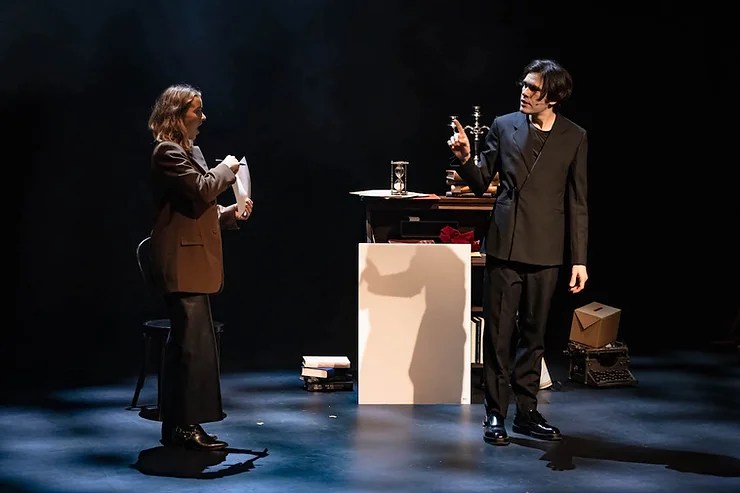Reviewed by Malcolm Calder

Auckland Shakespeare in the Park 2024
Measure for Measure
By William Shakespeare
A Shoreside Theatre production
Pumphouse Amphitheatre
(if wet – Pumphouse Theatre)
Jan 23, 24, 26, 28, 30, Feb 6, 9, 10, 11, 13, 15, 17
Reviewed by Malcolm Calder
Measure for Measure is one of the comedies that’s billed as a play for today. Peopled by a typically diverse cast, it’s hilarious and increasingly convoluted mundane day-to-day content provides context and plenty of laughs. Some of Shakespeare’s characters simply fill space but a core soon emerges and, with them, the not uncommon Shakespearean themes of intrigue, manipulation and resolution are revealed.
For openers, the rather wearisome Duke of Vienna (Stephen Tupp) decides to take an extended timeout leaving his deputy Angelo (Nick Milnes) in charge. And that’s where things get interesting because Angelo takes a more hardline view of both public morals and the law, before revealing a worldview that is essentially flawed. In particular, he is concerned about sex outside of marriage. So he sets about closing all Vienna’s brothels and heavily penalising anyone who dares fornicate privately – with the penalty being death of course.
One of the first to feel his ire is a likeable young chap called Claudio (Chis Raven) who has very few words in the playscript, but whose situation and fate quickly become something of a fulcrum for what follows. He must have been a sweet-talker in private though because he has somehow managed to impregnate his publicly mute fiancée Juliet (Alice Dibble).
However, when Claudio’s sister, the novice nun Isabella (Āria Harrison-Sparke), learns of this she is outraged and thereby hangs the nub of Shakespeare’s play. Echoing social mores that are sometimes as prevalent today as they were 400 years ago, Angelo says he’ll only do it if Isabella yields her own virginity to him. The cad!
Thus comedy becomes context, and hypocracy, truthfulness and justice are revealed as what this play is about.
Rather than a strong Duke who eventually returns from his sojourn as a Friar and comes up with a Plan B that sees Angelo’s jilted fiancée Mariana (Terri Mellender) substitute for Isabella, the key protagonist is revealed instead to be Isabella herself.
Āria Harrison-Sparke handles this with aplomb, assuredness and maturity. In particular her command of Shakespearean dialogue is of a considerable order.
Nick Milnes ties himself in knots at times as Angelo and Terri Mellender makes a delightful, if giggly, wronged fiancée. Escalus, ever the civil servant is played very straight by Stephen Ellis and the lesser character-roles provide some big laughs. Perhaps of note was Michelle Atkinson (Provost) who introduced both subtlety and nuance to her Provost.
The set is fairly stark and simple, as are the props. Of particularly ghoulish note was the severed head of not-Claudio and brought directly from his beheading and I could swear it as still dripping blood!
Eventually the good Duke shucks off his Friar mantle, resumes his Duke-ness, sentences Angelo to wed Mariana, then threatens to kill him as well. But Mariana and Isabella plead for Angelo’s life, reveal that Claudio is alive, the Duke pardons Angelo and proposes to Isabella, while Claudio and Juliet presumably live happily ever after – even if their newborn bites Claudio’s finger.
As I said, very convoluted, but also very Shakespearean.
Most audible, even from his proper tongue,
“An Angelo for Claudio, death for death.”
Haste still pays haste, and leisure answers leisure;
Like doth quit like, and measure still for measure.
Unlike last year’s Shakespeare-in-the-Park season where winds blew and cheeks cracked, Shoreside Theatre is looking forward to better weather this summer. Nonetheless, the white noise created by even the gentlest breeze in the trees surrounding this outdoor venue makes it sometimes difficult for a cast to project beyond it so seating in the forwards rows is recommended. Rather surprisingly it got a tad chilly as the evening wore on and a good jacket, or even a blanket, is suggested.
This annual two-play season (although not reviewed here, the other is A Midsummer Night’s Dream) is now firmly established on the Auckland theatrical calendar in this, its 28th season.
